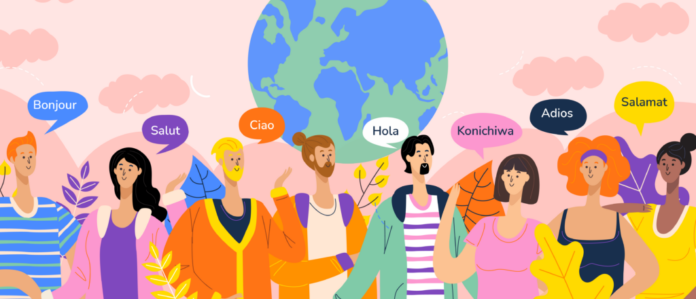By Carmen Chang,
In an era where digital innovation and business acumen dominate the headlines, the relevance of language studies is increasingly questioned. Do degrees in literature, translation, and cultural studies still open doors in today’s competitive job market? What careers await graduates of the humanities? To tackle these questions, the Faculty of Arts at Sorbonne University, in collaboration with its Career Platform, hosted an insightful roundtable on February 27, 2020, titled “Language Studies: What’s the Point?”
The event featured three alumni —Asa Josefson, Kataryna Rzasa, and Justine Fernandes— each of whom has navigated the professional world in different directions after completing their studies in the humanities. Their testimonies provided a nuanced picture of how language and culture studies intersect with sectors such as recruitment, translation, engineering, and international project development.
From Language Student to Client Project Coordinator: Asa Josefson’s Journey
Asa Josefson began by sharing her experience of transitioning from academia to the corporate world. Originally trained in a bilingual business master’s program, Asa now works as a Client Project Coordinator in the Netherlands. She admitted that her path into this role was not conventional. “I never imagined I would work in recruitment,” she said, “but my degree gave me exactly what I needed: analytical thinking, adaptability, and communication.”

Asa’s success in landing her first position was, in part, thanks to her strong presence on LinkedIn, a tool she encouraged students to use strategically. She emphasized the importance of selecting keywords, refining your skillset, and keeping your profile professional. “LinkedIn is not just social —it’s also a recruitment engine,” she explained. Her advice resonated with students uncertain about how to bridge the gap between language degrees and job offers.
Translating Skills into Business Success: Kataryna Rzasa’s Experience
Next, Kataryna Rzasa offered a perspective grounded in both academia and industry. Now a Translation Project Manager working with Polish and French clients, Kataryna detailed her journey from undergraduate studies to a doctoral degree. Her education followed a traditional path —Bachelor’s, Master’s, and PhD— but her career has been anything but linear.
One of the most valuable aspects of her education, Kataryna said, was participating in a work-study program, which allowed her to study and gain professional experience simultaneously. Early in her career, she earned between €1,100 and €2,700 per month, with significantly higher salaries when working in start-ups. “Start-ups are more flexible, more innovative—and they pay better,” she noted.
Kataryna also emphasized the necessity of technical literacy. As someone working in the translation and localization industry, she stressed that knowledge of software tools and artificial intelligence applications is now essential. “Languages are not isolated from tech anymore,” she said. “We need to know how to work with CAT tools, AI-assisted translation, and even coding basics in some cases.”
Her language skills opened many doors. As a client manager for e-commerce and private sales, she traveled across Europe and worked closely with international teams. Over time, she moved into bilingual administrative roles, earning up to €30,000 annually. However, she was clear on one key requirement: “Professional fluency in English is non-negotiable,” especially when it comes to job interviews and high-level communication.
Research Meets International Relations: Justine Fernandes on Cultural and Scientific Projects
Rounding out the panel, Justine Fernandes shared her remarkable transformation from student to project engineer, researcher, and postdoctoral fellow. Her message was clear: studying languages and culture is compatible with high-level research and international collaboration.
One of the key insights she brought to the table was her experience with research funding, particularly within the European Union. She highlighted that the EU often invests between €3 million and €10 million into large-scale collaborative or individual scientific projects. She encouraged students to explore funding databases and calls for proposals to turn their ideas into concrete initiatives.

Fernandes also emphasized the importance of building an international profile. She strongly recommended participating in programs such as ERASMUS, which provide both linguistic immersion and cultural awareness —key assets in today’s interconnected job market. “A multilingual profile,” she argued, “is increasingly valuable in fields like marketing, diplomacy, education, and international business.”
Her own path led her through multiple internships and field experiences that enriched her technical and interpersonal skills. For Fernandes, research and project engineering are not contradictory to humanities training —they are complementary. “A background in the humanities helps you manage people, ideas, and long-term strategies,” she concluded.
Reflections and Critical Gaps
While the roundtable offered compelling insights into how language studies can be transformed into career assets, there were some notable gaps. Several scheduled speakers were absent, and there was limited representation of Latin American or Hispanic studies, a field increasingly relevant in global discussions about migration, media, and culture.
Most of the speakers were focused on business, marketing, and science-related careers, leaving less room for students interested in more academic or socially-driven paths such as education, publishing, or nonprofit work. This reflects broader trends in society, where entrepreneurship and commerce often receive more attention —and funding— than the arts and humanities.
Still, the presenters succeeded in highlighting the practical value of linguistic and cultural knowledge, especially when combined with adaptability, technical skills, and real-world experience.
Takeaways for Students and Educators
The main takeaways from the discussion were clear and consistent:
- Multilingualism is a competitive advantage, especially when paired with strong English communication.
- Internships —both pre-professional and professional— are essential for building a career path.
- Digital and technological skills must accompany linguistic expertise in today’s workforce.
- Participation in international programs, like ERASMUS or global volunteering, broadens perspectives and builds strong CVs.
- Research and project management are viable and often underestimated pathways for humanities graduates.
Such events are crucial for helping students connect academic training with career realities. They also remind educational institutions of the importance of career support tailored to humanities students, who may need more guidance to navigate the increasingly complex job market.
Conclusion: Humanists Have a Place
In the end, “Language Studies: What’s the Point?” was not just a rhetorical question —it was a challenge to rethink how we frame the humanities in today’s world. While the content of the session remained somewhat introductory, the event opened important doors: it demystified the transition from studies to employment and illustrated that language graduates are not limited —they’re versatile.
Whether in corporate offices, research labs, or cultural institutions, humanists have the tools to lead, communicate, and innovate. All they need is confidence, strategy, and the support to translate their potential into action.
Reference
- Faculté des Lettres de Sorbonne Université & Plateforme Carrière. (2020, February 27). Table ronde n°7 : «Des études de langues, pour quoi faire?» Panel discussion with Asa Josefson, Kataryna Rzasa, and Justine Fernandes. Sorbonne Université, Paris.




